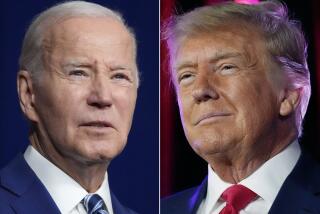Pakistan Vote Means Little to Laborers
- Share via
TAXILA, Pakistan — It matters little to Ghulam Mustafa who wins Wednesday’s crucial national election here.
“No matter who wins,” he said, “nobody give us nothing. We work and we eat, and we still have too little.”
Ghulam Mustafa is a stone crusher in this 2,600-year-old village 25 miles outside Islamabad, capital of Pakistan. Like his 10,000 fellow laborers in ancient quarries, Mustafa measures his days not in hours but in length--the distance he chips his way into the Margalla Hills by hand for $3 a day.
By his own reckoning, Mustafa has chipped away and crushed more than 7 miles of stone in his 14 years in Taxila’s quarries, years that have made his beard gray, his skin and lungs flecked with white dust and his face like that of a 60-year-old man.
Cannot Read His Own Name
Ghulam Mustafa is just 26. But he doesn’t know it. Like the overwhelming majority of the 48 million Pakistani voters who will go to the polls to choose between the opposition party of Benazir Bhutto and the conservative establishment that Pakistan’s late military ruler, President Zia ul-Haq, left behind, Mustafa cannot even read his own name or age.
“Are you happy the elections are coming?” a stranger asked Mustafa on Saturday through the suffocating dust and din of the crushing machines.
“I don’t know,” he said blankly. “I don’t care. I don’t even know how old I am.”
For Pakistan’s ruling elite, Wednesday’s election will determine which of the country’s powerful families and political factions win the 205 legislative seats at stake and form the government that will rule Pakistan for the next half-decade.
For the U.S. government, which ranks Pakistan among its closest and most strategic allies, the polls pit the forces of conservative, pro-American capitalism against the moderate-to-left-leaning followers of Benazir Bhutto and her late father, former Prime Minister Zulfikar Ali Bhutto.
But for day laborers like Ghulam Mustafa and the millions of illiterate farmers and workers who compose the majority of Pakistani voters, Wednesday’s decisions will be made on much simpler issues, such as food on the table.
Iqbal, a wheat farmer who said he has only one name, said his vote has nothing to do with world issues.
“We people cannot understand this diplomacy and such,” he said. “We are illiterate. We know only our farming. If people give us good works and projects, we are very happy, and we vote for them.”
Pakistan’s political conflicts show clearly in Taxila, site of an ancient and sophisticated civilization and a district that now is home to modern weapons factories, steel foundries, tenant farms and the crude, stone-crushing mills.
As it is nationwide, the race for Taxila’s National Assembly seat is largely between two forces--the candidate of a conservative, nine-party, establishment-backed coalition called the Islamic Democratic Alliance and the candidate backed by Benazir Bhutto’s Pakistan People’s Party.
The establishment candidate is Zia’s petroleum minister, Chaudhry Nisar Ali, who has continued to hold power in the interim Cabinet that has run Pakistan since Zia was killed Aug. 17 in a plane crash.
Nisar, 34, holds a masters degree in international relations. He is articulate, dynamic and credited with streamlining his ministry by pushing through oil-exploration applications for foreign oil companies, increasing Pakistan’s oil production almost 100% in 15 months.
In dozens of campaign speeches in the villages of Taxila, though, Nisar never mentions oil. Instead, he reminds the voters that, during his three years as their national representative, the district has gotten 34 schools, three colleges, 11 hospitals, 90 electrified villages, $1 million in bridges and $3 million worth of roads.
The People’s Party, on the other hand, is fielding a 70-year-old retired army colonel who has spent the last seven years in exile in Libya, where he served as editor of Libyan leader Moammar Kadafi’s English-language propaganda journal and organized anti-American street rallies after the United States bombed Kadafi’s home in Tripoli in 1986.
Col. Habib Khan spent four years in jail in Pakistan after Zia led the 1977 military coup that overthrew Benazir Bhutto’s father. He left Pakistan in 1982, one of 52 prisoners exchanged for hostages on a jetliner hijacked by a terrorist group led by Bhutto’s two brothers.
When Habib left, Zia called him and the others, “traitors” and “rotten eggs” who had been purged.
When he returned to Pakistan in September, Habib won a spot on the People’s Party ticket over five other local contenders in Taxila with the help of his son, Iqbal Habib, who, during his father’s exile had married a sister of Benazir Bhutto’s husband, Asif Zardari.
Bitter Views on America
Despite Benazir Bhutto’s pro-American stand, Col. Habib made clear in an interview with The Times his own bitter views on capitalism and America, which, he said, ignored his request in 1982 to emigrate there, rather than Libya, as a political refuge.
“I studied at Ft. Lee (Va.) in 1958, but my friends in America seemed to have forgotten me,” he said with a smile, adding that after seven years in Libya, reading and interpreting Kadafi’s so-called Green Book, the bible of his revolution, his views of America have hardened.
Of Kadafi’s Libya, he said it is “the type of democracy that we used to have in 600 BC.”
In the Taxila district, which began as a Hindu kingdom around that time, rural grass-roots democracy appears to have changed little in those 2,600 years.
“People in the villages, their idea is just that their own small, petty problems must be solved,” Habib noted.
More to Read
Sign up for Essential California
The most important California stories and recommendations in your inbox every morning.
You may occasionally receive promotional content from the Los Angeles Times.










